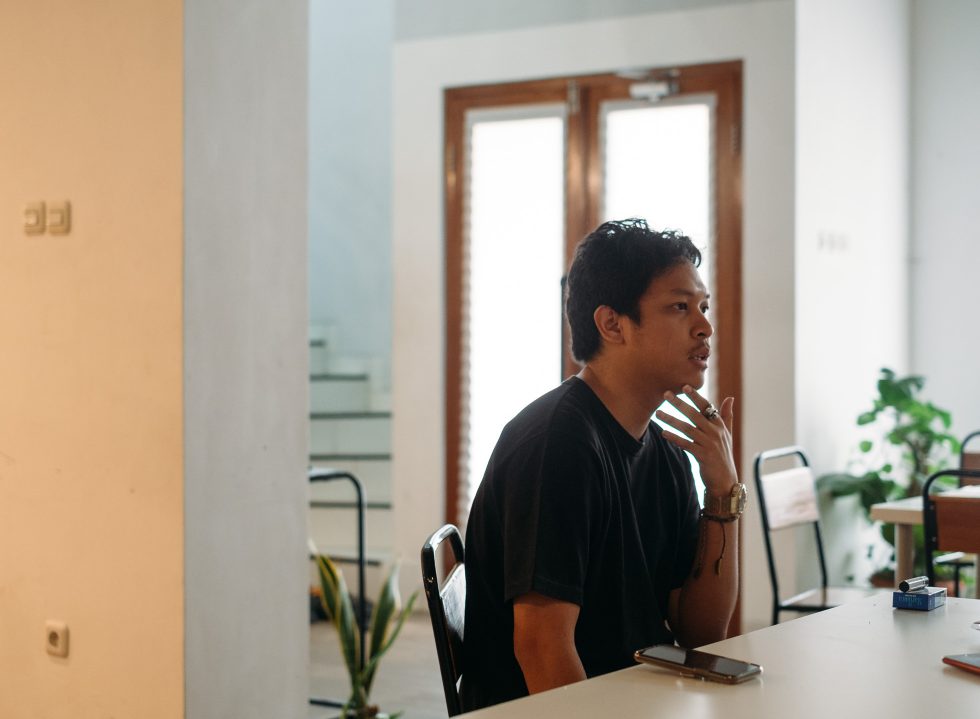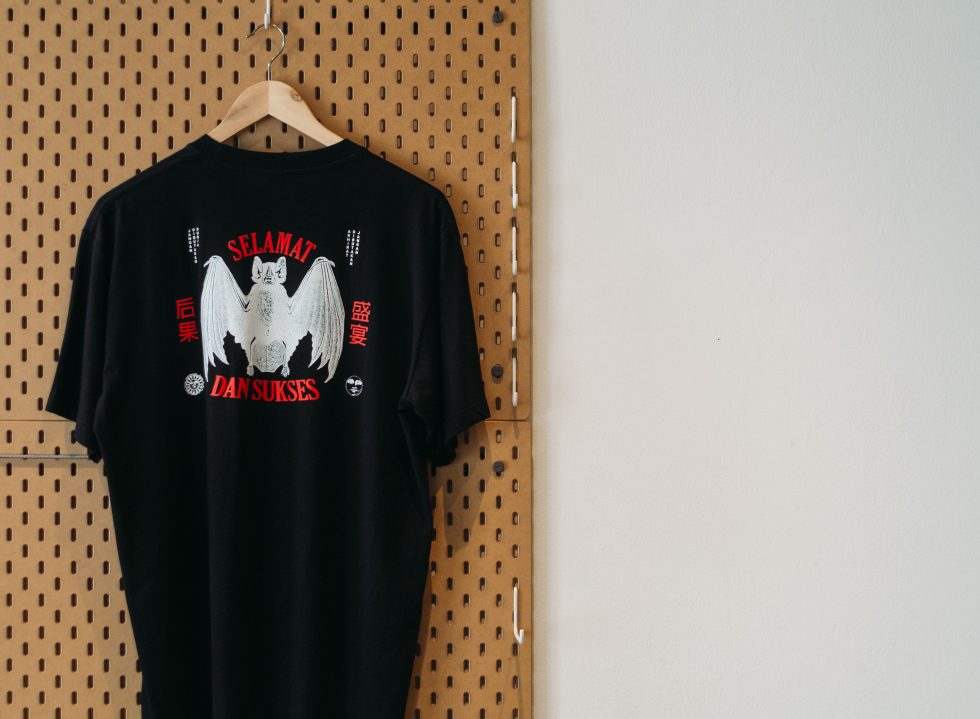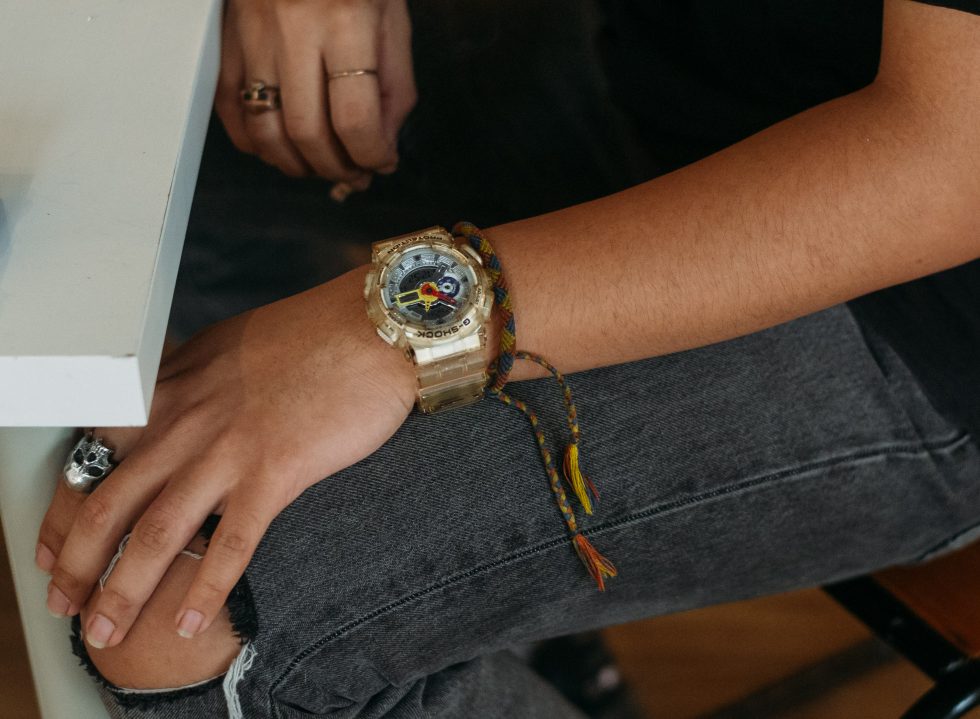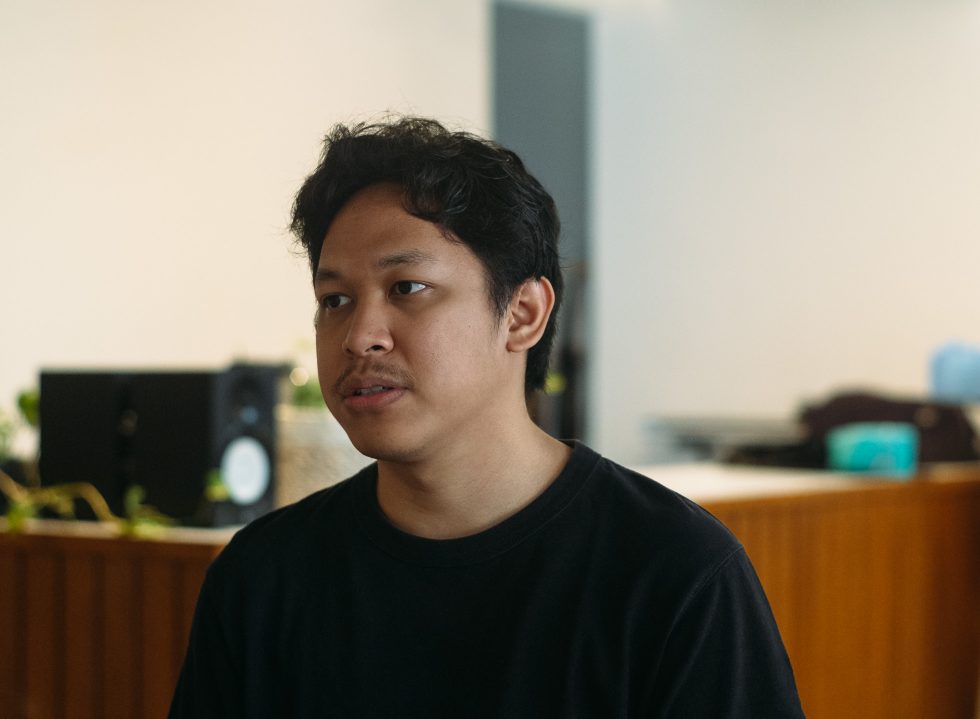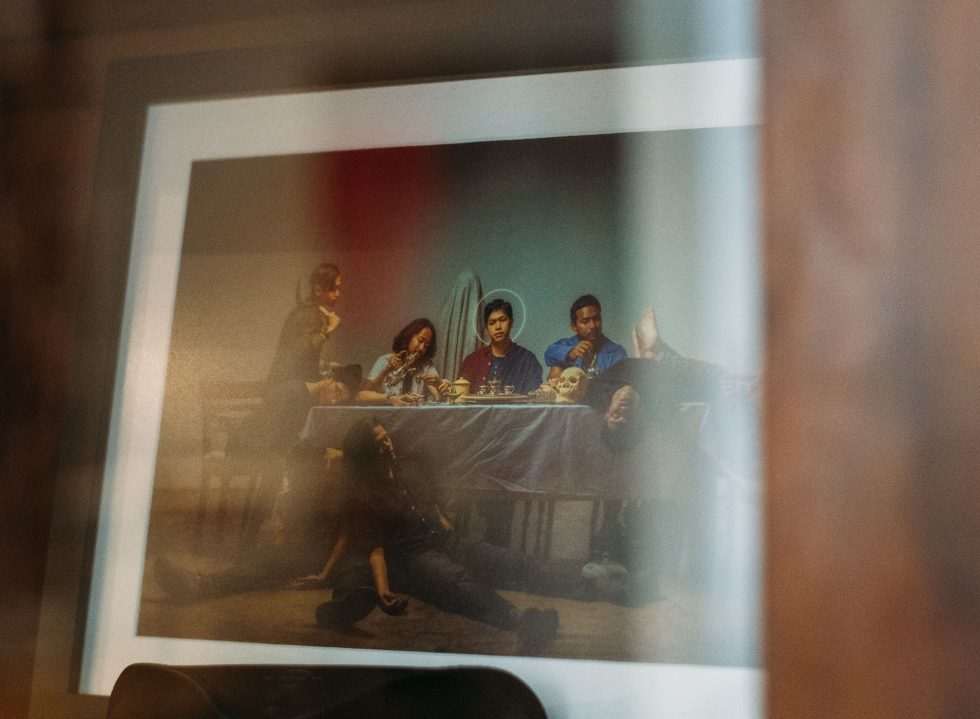The youngest of three, Daniel Baskara Putra, or simply Bas, confesses how he shied away from learning music during his childhood. This was because his brother, Adrian Mahendra, was early to excel at music before he fled abroad to study, then fled farther to work. “I held myself back so many times from playing music out loud, simply because he was so good at it.” He talks about how his brother played a part in shaping his fascination with music.
Baskara’s name has been rocketing for the past year: if not as his recent solo stage name Hindia, then definitely as .Feast’s vocalist, an indie/progressive rock band that was born in 2012. But those who are familiar with the 26-year-old’s musical career so far, it’s not difficult to distinguish the two.
When it comes to the band, one would associate it to the crowd-surfing passion at their gigs with Baskara’s rasping voice singing of political distress, or the striking drummer Ario ‘Bodat’ who—more often than not—appears shirtless. While the band’s performances are famous for their raving spirit, Hindia embodies toned-down endeavors of everyday life and its many struggles. “You have to have a certain disappointment with [the state of politics] to like .Feast, but not with Hindia,” expresses Baskara.
It does not matter what Baskara brings to these two different tables, for he believes that the root of these works is the mere sense of relatedness, be it politics or personal strife. “When people say this generation is apathetic, I don’t believe that to be true,” he answers when I asked about our generation’s activism. Taking turns between sipping his coffee and puffing cigarettes, the musician continues, “I think it’s a luxury to be able to think of politics, that means you don’t have anything else to worry about. Let alone politics, most [millennials] haven’t even figured out how to survive until payday.”
Some topics, like politics, aren’t left ‘untouched’ out of ignorance. Instead, he identifies with the reality that “We are all aware that something is wrong, or has been wrong, with our government. But I guess each of us walks different lives with different privileges. And some didn’t have [the privilege] to be exposed and learn about it to be vocal and do something.”
Baskara himself comes from an upper middle class family, drawn to politics since primary school and later exposed to it as a young adult when he studied Communications in Social and Political Studies in University of Indonesia. As a child, he remembered rewarding himself with surfing the web for conspiracy theories and a bowl of Indomie after the long hours at school. Memories of his parents fussing over stock exchange intrigued his curiosity, only to learn that this seemingly uninteresting issue affected everybody unexceptionally—even those who turned a deaf ear.
Then it’s only fitting that he followed that interest into college where he crossed paths with friends in the faculty, now turned .Feast band members. As students, not a day went by without being exposed to activism, including back-to-back discussions of political turmoils that eventually hauled him into the communities. The country’s political history stirred angst and frustration, with senior activists falling short of success to catalyse change despite the scales of past protests. “Time has changed. Back in the day, we had to burn tires to be noticed. Now, we need a new medium in a new format to voice our concerns and reach out to the younger generation.”
“These are not soundtracks to activism. I only see [.Feast] as a vessel, and these are the voices of many people who are disappointed.”
This palpable passion led the way for .Feast’s success, but not without tints of disappointments and obstacles along the way. “We were often told that our works will not make it due to the ‘prompting’ subjects. That brands will not endorse us,” Bas continues, “but that’s where they’re wrong. We are not exploiting these traumas. And no matter what we do, it’s never enough to prove to the world that we are genuine.”
The band has always been transparent about their messages and sugarcoating was never a part of their deal. Among their works is their single Peradaban from their notorious E.P. Beberapa Orang Memaafkan, whose music video reflects on the country’s political and cultural crisis through snippets of violence held by armed forces during past riots, a tilt shot of Borobudur temple and a glimpse of the gone but not forgotten human rights activist Munir Said Thalib (familiar with his nickname Munir), whose murder case remains unsolved. To date, the track has 13 million listeners on Spotify and is recognised nationwide.
“Our early works received mixed responses. Those who understood, liked it. The rest was bitter. But the release of BOM (Beberapa Orang Memaafkan—a mini album that pays homage to the 2018 Surabaya church bombings) was a breakthrough. We learned that everybody feels the same way about this gruesome tragedy, and maybe even about society in general,” he goes. Though the album received equal amounts of praise and criticism, Baskara learned that he was not just addressing concerns that have been haunting him and his closest ones, but also that of many others. “These are not soundtracks to activism. I only see [.Feast] as a vessel that carries the voices of many people who are disappointed.”
Baskara’s works are deeply infested with symbols, both in .Feast and his solo venture. In Beberapa Orang Memaafkan album cover, Baskara and his band depict mourning and forgiveness through a covered Holy Mary with a rosary on her right hand and iron chain on the other, followed by the band’s rendition of Da Vinci’s The Last Supper painting. This links to the musician’s disagreement with the majority’s extreme sentiments towards certain symbols. “What’s funny is how people tend to fear symbols and not realising that these symbols don’t mean anything but beliefs that preach kindness.”
“I feel like music always has that kind of immunity when you speak about something with weight.”
It’s typical of .Feast or Hindia to embody their values through profound texts or visuals, as if gathering thousands into one room and giving each one a pat on the shoulder. When Hindia performs, contemplative texts are part of his stage, among them: “No religion higher than love.”
The philosophy reminds me of the multidimensional principle “No religion higher than truth”, and when I ask him on his perception of this creed, he admits that he was inspired by his past interfaith romantic relationship. “Faith was not the reason why it ended, but I think the way we are denied from being with someone of different faith says a lot about religion.”
After Baskara and his partner parted ways, he transcended the philosophy into something universal; if religions are equal, why are some groups treated unfairly? “And this applies anywhere in the world. What was once inspired from my personal relationship has now implemented far bigger things, and it’s amazing how music has the power to eclipse that. I feel like music always has that kind of immunity when you speak about something with weight.” The tense air slowly subdues. “I’m happy and my heart is warm, because through music everybody of different spiritual backgrounds can sing it with me.”
“You have to have a certain disappointment with [the state of politics] to like .Feast, but not with Hindia.”
Both .Feast and Hindia’s gigs are always thronged with hundreds of singing, jumping souls. And in a country where public assault is prevalent in public spaces, the risk of this misdemeanour heightens thrice in music festivals. Back in October last year, Baskara and Kunto Aji initiated an approach to prevent these violations from happening. Followed by other musicians like Danilla and The Panturas, the prevention is formed as a blinking S.O.S video for the audience to download and flash anytime when the unwanted occurs.
“It was triggered by a sexual harassment in one of .Feast’s live performances, which is also something that we’ve been worried about for so long.” The musician expresses his displeasure of the incident. “I believe that this problem is deep-rooted and structural. Sexual assaults cannot be reduced to who, when, what or where. And this means [the S.O.S prevention] will never be enough to resolve the problem and we need a much bigger campaign to address this, but at least we started something.” Baskara exhales, smoke from his mouth, and at this point we lost count on the cigarettes.
Towards the end of our interview, I ask him how he felt about Jakarta, the city that has contributed so much to his success. Sick of all things extravagant, Baskara treasures the timeless water fountain just by Plaza Senayan, where class is almost nonexistent. “Imagine this, a well off C.E.O and an office boy litter their cigarette butts on the floor, and both get nagged by the security!” He paused before he continues, “When beautiful things and beautiful places have all been written, who is to write of worn, noisy places like these?”
